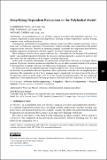Simplifying dependent reductions in the polyhedral model
Author(s)
Yang, Cambridge; Atkinson, Eric; Carbin, Michael
DownloadPublished version (1.384Mb)
Publisher with Creative Commons License
Publisher with Creative Commons License
Creative Commons Attribution
Terms of use
Metadata
Show full item recordAbstract
© 2021 Owner/Author. A Reduction-an accumulation over a set of values, using an associative and commutative operator-is a common computation in many numerical computations, including scientific computations, machine learning, computer vision, and financial analytics. Contemporary polyhedral-based compilation techniques make it possible to optimize reductions, such as prefix sums, in which each component of the reduction's output potentially shares computation with another component in the reduction. Therefore an optimizing compiler can identify the computation shared between multiple components and generate code that computes the shared computation only once. These techniques, however, do not support reductions that-when phrased in the language of the polyhedral model-span multiple dependent statements. In such cases, existing approaches can generate incorrect code that violates the data dependences of the original, unoptimized program. In this work, we identify and formalize the optimization of dependent reductions as an integer bilinear program. We present a heuristic optimization algorithm that uses an affine sequential schedule of the program to determine how to simplfy reductions yet still preserve the program's dependences. We demonstrate that the algorithm provides optimal complexity for a set of benchmark programs from the literature on probabilistic inference algorithms, whose performance critically relies on simplifying these reductions. The complexities for 10 of the 11 programs improve siginifcantly by factors at least of the sizes of the input data, which are in the range of 104 to 106 for typical real application inputs. We also confirm the significance of the improvement by showing speedups in wall-clock time that range from 1.1x to over 106x.
Date issued
2021Department
Massachusetts Institute of Technology. Computer Science and Artificial Intelligence LaboratoryJournal
Proceedings of the ACM on Programming Languages
Publisher
Association for Computing Machinery (ACM)